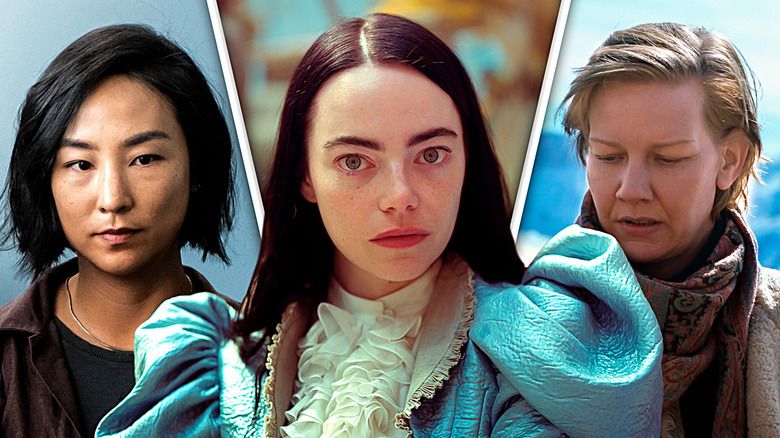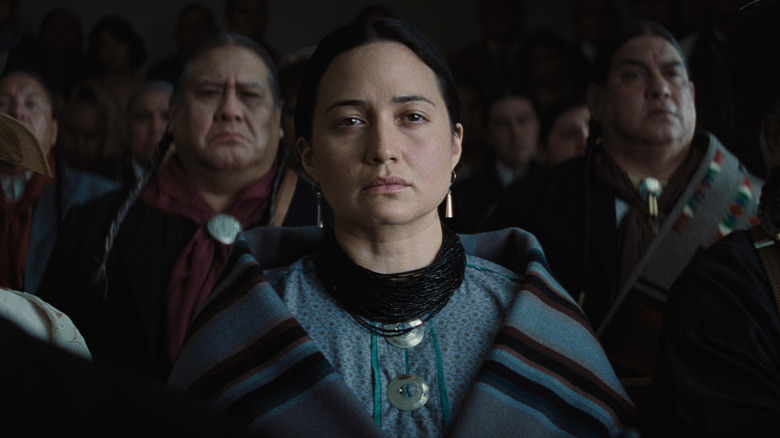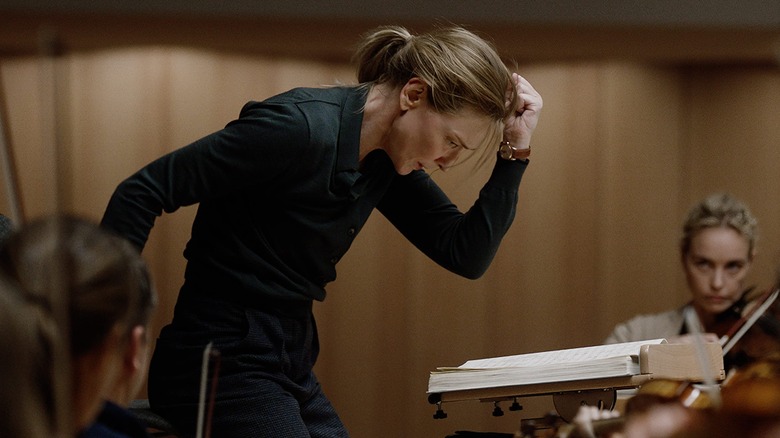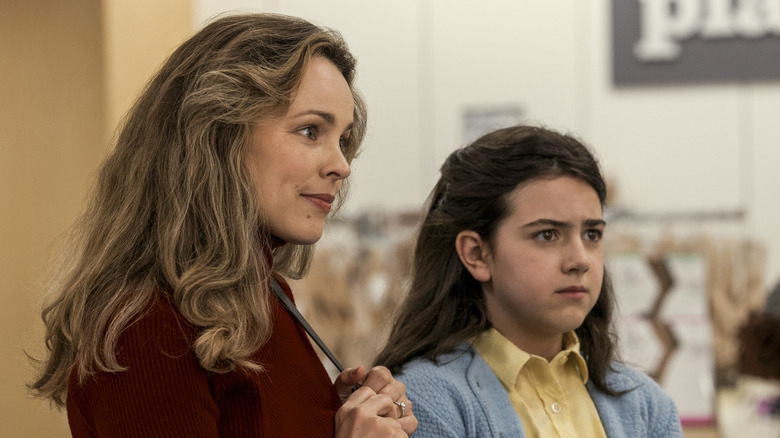Oscars 2024 Prove That Women Have To Suffer On-Screen To Win Awards
Movies about the female experience don't typically do particularly well at the Academy Awards, to be utterly frank — one only needs to look at "Barbie" and its lack of nominations for leading actress Margot Robbie and director Greta Gerwig to prove that. Not only that, but to win an Oscar, women are forced to suffer greatly on-screen.
A lot of films — and many of the movies nominated for Academy Awards at the 96th ceremony in 2024 — focus on male characters and their triumphs and joys. Certainly, plenty in that particular grouping play with this trope; "American Fiction" tackles the myopic, often bleak view of the Black experience in the United States while also centering characters within the film who lead complicated, happy, and difficult lives with real ups and downs. That said, very nearly every 2024 Best Picture nominee features at least one long-suffering, prominent female character who endures terrible trauma, from "Killers of the Flower Moon" to "Maestro" to "The Holdovers" to "Oppenheimer." (In the case of those four movies, three out of the four devastated women are the wives of the lead character.)
"Past Lives" and "Barbie" are the two outliers, and neither one has a shot of winning Best Picture. Those movies do feature complicated, fascinating female characters who experience emotional journeys, but the endpoint is joy and fulfillment rather than continued misery. The Oscars don't go for things as "simple" as that ... which is why happy, uplifting stories about women just don't win awards at the ceremony.
The leading women of this year's Oscar nominees go through terrible trials
This year's "serious" and nominated performances by actresses in both supporting and leading roles largely tell one story: women's lives are built upon a foundation of suffering and pain.
In "Killers of the Flower Moon," Lily Gladstone's Mollie Kyle is one of the most powerful women living on the Osage reservation that owns and controls a vast expanse of oil — and she gets to experience a small taste of joy when she falls in love with and marries Ernest Burkhardt (Leonardo DiCaprio). This doesn't last. As Ernest quietly murders several members of her family (following his uncle's orders), Mollie experiences tremendous grief and pain — which is to say nothing of her physical struggle with diabetes. Gladstone, the first Native American actress nominated for an Oscar for best actress, is phenomenal. It's a shame she's not given more to do than cry, sweat, and mourn.
"Anatomy of a Fall" focuses on a murder trial that accuses Sandra Hüller's character Sandra Voyter of murdering her husband. "The Holdovers" only features one prominent female character, Da'Vine Joy Randolph's Mary Lamb, whose son was killed while serving in Vietnam. Carey Mulligan and Emily Blunt in "Maestro" and "Oppenheimer," respectively, are archetypes of the long-suffering wife whose genius husband constantly eludes them. "Poor Things" might end happily for Emma Stone's Bella Baxter, but she only exists because she died by suicide and a scientist placed her baby's brain within her own skull. (She's also ultimately forced into sex work.) So is this a new trend? No. Not at all.
If you or someone you know is struggling or in crisis, help is available. Call or text 988 or chat 988lifeline.org
The trend of the Oscars prioritizing female suffering has been around for years
One only has to look at the list of female performers who've taken home trophies for acting in the past several years to notice a trend — a lot of their characters suffer greatly. Yes, Fern (Frances McDormand) ends "Nomadland" in a peaceful place, but she embarks on her fulfilling journey only after losing her husband and job (and, not for nothing, spends a lot of the movie pooping in a bucket). Renée Zellweger's turn as Judy Garland in "Judy" really honed in on the most troubled aspects of the legend's life, and Olivia Colman's twisted Queen Anne in "The Favourite" is as demented and tragic as they come. Brie Larson won for "Room," where she plays a woman held captive for the majority of her adult life. A few years before "Nomadland," McDormand took home an Oscar for playing a woman relentlessly putting up billboards to figure out who killed her daughter. Not one of these stories is happy.
Then there's Cate Blanchett, a phenomenally talented actress who's made a habit out of playing tormented women. Her most recent Oscar nomination was for playing the self-destructive and ultimately disgraceful conductor Lydia Tár in 2022's "Tár," and her most recent win came in 2014 for Woody Allen's "Blue Jasmine," a modern take on "A Streetcar Named Desire." Between other nominated roles like "Notes on a Scandal" and "The Aviator," Blanchett's roles are rarely easy or breezy; the ones that are, like her turns in "Ocean's 8" and "Thor: Ragnarok," are viewed as silly little romps rather than actually solid performances from the star.
As a result, films that focus on women's joy are fully overlooked at the Academy Awards
With all of that in mind, let's look at the films that were nominated for Oscars that are likely just honored to be included — as well as critical darlings that missed the cut. Both "Past Lives" and "Barbie" offer insightful, incisive looks at womanhood, yearning, and personal growth. Neither will win Best Picture. The respective stars, Greta Lee and Margot Robbie, were both left out of the best actress category, alongside their directors Celine Song and Greta Gerwig. While both movies put their female leads Nora (Lee) and Barbie (Robbie) into emotionally fraught situations, the stories feature relatively low stakes. This doesn't make them less worthy in actuality; it just means they're slightly quieter than their competition and thus, the performances and directors weren't given a fair shake.
Another particularly egregious example — which received zero nominations — is the beloved 2023 adaptation of Judy Blume's novel "Are You There, God? It's Me, Margaret." Directed by Kelly Fremon Craig and starring Abby Ryder Fortson as Margaret and Rachel McAdams as her mother Barbara, the film is a moving, straightforward, and extraordinarily layered portrait of both girlhood and womanhood, between Margaret navigating puberty and Barbara trying to carve out her identity beyond being Margaret's mother. Despite widespread praise for McAdams' performance in particular, a movie like this simply wasn't recognized, because nobody leaves the narrative completely traumatized.
Women don't need to be brutalized, harmed, or otherwise in distress for their stories to be important ... but according to the Oscars, they do. Perhaps one day, a story about a woman simply being happy might have a shot at best picture. But for now, suffering is key.



